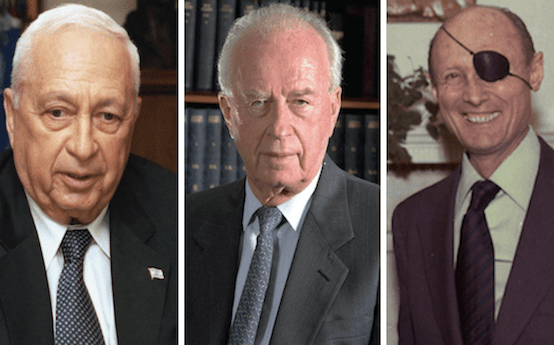Ex-Israeli Officers Launch Political War Against Netanyahu

Imagine if almost all the Democrats running for president were ex-generals, and their main claim to rule was that, well, they were ex-generals. That’s the situation Israel has found itself in, about which is said: “Israel is an army with a country rather than a country with an army.”
Military officers, both in and out of uniform, have played an outsized role in every aspect of Israeli life. Moshe Dayan, with his fetching eyepatch, established the archetype. Yitzhak Rabin and Ariel Sharon both overcame mixed military legacies (as defense minister, Sharon was officially admonished for his role in the Sabra and Shatila massacre of Arabs in 1982) to make history as prime ministers. The martyred Rabin was the architect of the uneasy rapprochement with Yasser Arafat and the PLO. Sharon, who was denied Israel’s top military job, stopped the peace process begun by Rabin in its tracks.
Shimon Peres was never a member of this club. His lifetime of leadership in Israel’s security system, including his central role in creating the Israeli nuclear arsenal, failed to erase the sense that he was somehow an outsider. Current Prime Minister Benjamin Netanyahu is not himself a career soldier but he was an officer in the storied special forces of the Sayeret Makhtal, and his brother, Yoni, was an outsized casualty of Israel’s famed rescue at the airport in Entebbe.
With few notable exceptions, the record of Israel’s military chiefs as political and national leaders is less than stellar. For every Yitzhak Rabin, there are numerous pretenders like Yigal Yadin, Amram Mitzna, Shaul Mofaz, and Dan Shomron, whose stars sparkled brightly before quickly flaming out. Israel’s generals may have indeed proved their mettle on the battlefield, but their best days in politics were usually their first.

The latest example of the effort to spin military leadership into political gold is the creation of “Blue and White,” a coalition headed by—you guessed it—a former chief of staff, Benny Gantz, who retired from the military in 2015.
The election on April 9 remains Netanyahu’s to lose, but Gantz is treading a well-worn path. Since combining with another party to form Blue and White, he is winning public support less because of his political program, which in Gantz’s case is on the right side of anodyne, than of what he represents: the responsible stewardship of Israel’s military prowess in its never-ending battle against the Arabs.
Gantz, wrote one observer in the Jerusalem Post, “is an ideological free agent, which only increases his political value.”
Though they are increasingly fewer in number, there are Israelis who still favor a retreat from the West Bank and the creation of a Palestinian state with East Jerusalem as its capital. On this, Blue and White is definitely not their party. Indeed, one party leader described the movement as the new Likud. Bottom line: a vote for Gantz is not a vote against the program of the long-ruling Likud, but merely against Netanyahu’s leadership of it.
Joining Gantz are two other ex-chiefs of staff in the military troika at the head of the new faction, Gabi Ashkenazi and Moshe Ya’alon.
Ya’alon was an undisguised opponent of Secretary of State John Kerry’s negotiating effort, calling Kerry “delusional.” Ashkenazi’s sympathies are less hard-edged. In Israel today, this translates into support for what used to be viewed as a right-wing national security agenda.
Ya’alon was Netanyahu’s minister of defense and famously opposes any retreat on the West Bank or the creation of a Palestinian state. His political journey reflects that of the nation itself. Born and raised in the nurturing cradle of the long-ruling Labor Party, after leaving the Army’s top job in 2005, Ya’alon became a star in Likud, which suffered Labor’s uncontested rule for decades until 1977 when Menachem Begin and his settlement agenda prevailed.
Earlier this week, Gantz led a train of ex-military, intelligence, and security leaders, including former Mossad and Shabak (internal security) bosses, and the three other ex-chiefs of staff on the party list, to the Golan Heights.
They traveled to the Syrian border to declare that Israel would never retreat from the Golan Heights and would continue pushing for international recognition of Israel’s sovereignty over the territory—a new favorite idea of Republicans in the Senate—which Israel captured in the June 1967 war.
“We will increase the settlement of the Golan in a way that shows the world clearly—we will not come down from the Golan; the opposite—it will be developed and [its population] doubled,” Gantz said.
None of this is news to Bashar al-Assad. But of course, sitting in Damascus 269 kilometers away, he wasn’t the audience.
Gantz’s campaign strategy appears to be producing electoral dividends, so much so that he is considering how to form the next Israeli government after elections on April 9—with Bibi’s party, but without the battle-scarred political veteran himself.
Netanyahu’s strategy to confront this challenge is an improbable one, which nevertheless has proven effective before. He is trying to convince voters that these standard-bearers, who have spent a lifetime in service to the country—Gantz’s was selected by Bibi himself to lead the army—are in fact dangerous leftists. A Likud campaign video cautioned that the former generals are in league with those who would “hand the Gaza periphery to Hamas,” and “will sit with [Arab lawmaker Ahmad] Tibi in an [electoral] bloc” if he wins the April election.
Netanyahu’s credentials as “Mr. Security” and Arab baiting are standard fare on the prime minister’s election strategy menu. The generals commanding Blue and White may find his troops harder to defeat than the Palestinians.
Geoffrey Aronson is chairman and co-founder of The Mortons Group, and a non-resident scholar at the Middle East Institute.